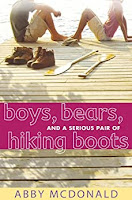I recently read Boys, Bears, and a Serious Pair of Hiking Boots by Abby McDonald. While I was a lot more interested in the serious pair of hiking boots than I was in the boys, it is an example of the kind of environmental book I'm interested in finding in YA and childlit.
American Green Teen Jenna heads off to Canada for the summer. This is a classic story start, one in which there is a disturbance to the main character's world. Why, I've used it myself. More than once. While off to our neighbor in the north, Jenna finds herself dealing with a lot of very traditional YA issues: summer boyfriends, growing away from a long-term friend, dealing with unpleasant people, mom and dad in meltdown. Arguably there is enough here for a couple of books.But then there is her environmentalism.
An Environmental Theme
I have trouble finding environmental themes in books. What many consider themes, I consider subjects. Environmentalism is a subject, not a theme, for instance. Single words usually are just subjects, in my opinion. So 'environmentalism is necessary' is closer to a theme, though as far as writing is concerned, it doesn't have a lot of built-in narrative drive.
Last month I attended a writing workshop in which we were told to ask ourselves "what is the central dramatic question of your story?' And that, friends, gets a lot closer to theme, as far as I'm concerned. What dramatic or life question is your story trying to answer?
In Boys, Bears, and a Serious Pair of Hiking Boots, I think the theme/question McDonald is trying to answer is "how do we live an environmentally responsible life?"
How DO We Live An Environmentally Responsible Life?
Jenna is very hot for environmentalism when her story starts. But everything in life has consequences of one sort or another and just as not living environmentally has consequences, so does living environmentally. Those consequences are not all clean air and water. There are sometimes impacts on people's livelihoods, and Jenna has to confront them here.
The book also includes a character who evolves into a cliched, strident environmentalist, probably meant as a cautionary tale. But her path is another possibility to consider when toying with how to live a life that is as environmentally sound as possible.
I can't say that all the elements of this book come together smoothly here. Loading Jenna up with so many YA issues distracts from her coming to terms with what kind of person/environmentalist she's going to try to be. But I very much appreciate that she's coming to terms with that at all.













































